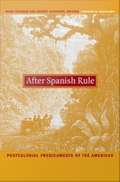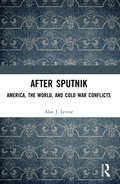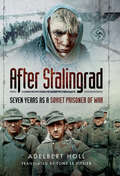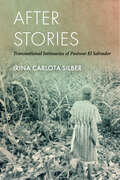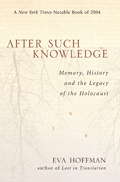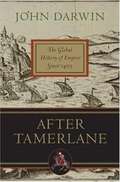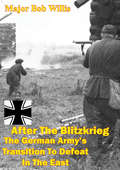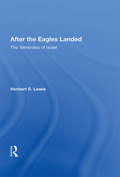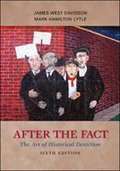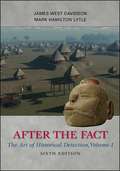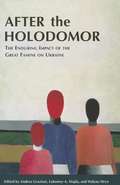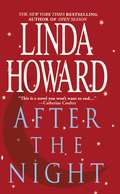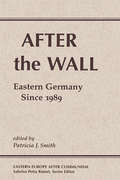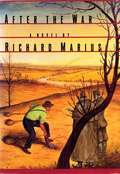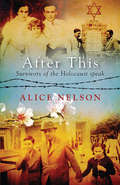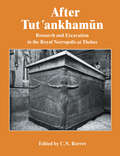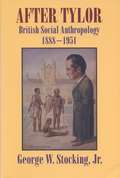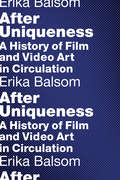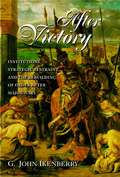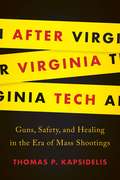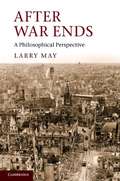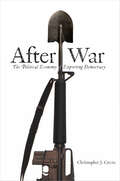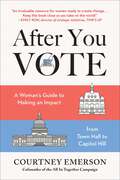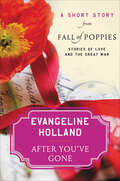- Table View
- List View
After Spanish Rule: Postcolonial Predicaments of the Americas
by Mark Thurner Andrés GuerreroInsisting on the critical value of Latin American histories for recasting theories of postcolonialism, After Spanish Rule is the first collection of essays by Latin Americanist historians and anthropologists to engage postcolonial debates from the perspective of the Americas. These essays extend and revise the insights of postcolonial studies in diverse Latin American contexts, ranging from the narratives of eighteenth-century travelers and clerics in the region to the status of indigenous intellectuals in present-day Colombia. The editors argue that the construction of an array of singular histories at the intersection of particular colonialisms and nationalisms must become the critical project of postcolonial history-writing. Challenging the universalizing tendencies of postcolonial theory as it has developed in the Anglophone academy, the contributors are attentive to the crucial ways in which the histories of Latin American countries--with their creole elites, hybrid middle classes, subordinated ethnic groups, and complicated historical relationships with Spain and the United States--differ from those of other former colonies in the southern hemisphere. Yet, while acknowledging such differences, the volume suggests a host of provocative, critical connections to colonial and postcolonial histories around the world. Contributors Thomas Abercrombie Shahid Amin Jorge Caizares-Esguerra Peter Guardino Andrs Guerrero Marixa Lasso Javier Morillo-Alicea Joanne Rappaport Mauricio Tenorio-Trillo Mark Thurner
After Sputnik: America, the World, and Cold War Conflicts
by Alan J. LevineOn October 4, 1957 in the midst of the Cold War, the Soviet Union launched Sputnik I, the first artificial earth satellite. For the West, and especially the United States, it was a shattering blow to national morale and pride. It led to a deep-seated fear that the Soviet Union would surpass the United States in both technology and power and that even nuclear war might be near. After Sputnik shows that the late 1950s were not an era of complacency and smugness, but were some of the most anxious years in American history. The Cold War was by no means a time of peace. It was an era of a different kind of battle—one that took place in negotiations and in the internal affairs of many countries, but not always on the battlefield. While many choose to remember President Eisenhower as a near-pacifist, his actions in Lebanon, the Taiwan Straits crisis, Berlin, and elsewhere proved otherwise. Seconded by his able secretary of state, John Foster Dulles, he steered America though some of the most difficult parts of the Cold War, not always succeeding, but preventing disaster. The Middle East and Berlin crises, the Indonesian Civil War, Fidel Castro’s rise to power, and other events are all bluntly discussed in the light of Western, and other, illusions and delusions. In this engaging history, Alan J. Levine delves deeply into this often misrepresented period of history, and provides new insight into one of the most formative decades in American history.
After Stalingrad: Seven Years as a Soviet Prisoner of War
by Adelbert HollThis WWII memoir of a Nazi infantryman captured at Stalingrad offers a rare firsthand account of life inside Soviet POW camps. The Battle of Stalingrad has been studied and recalled in exhaustive detail ever since the Red Army trapped the German 6th Army in the ruined city in 1942. But most of these accounts finish at the end of the battle, with columns of tens of thousands of German soldiers disappearing into Soviet captivity. Their fate is rarely described. But in After Stalingrad, German infantryman Adelbert Holl vividly recounts his seven-year ordeal as a prisoner in the Soviet camps. As Holl moves from camp to camp across the Soviet Union, he provides an unsparing view of the prison system and its population of ex-soldiers. The Soviets treated German prisoners as slave laborers, working them exhaustively, in often appalling conditions. He describes the daily life in the camps: the crowding, the dirt, the cold, the ever-present threat of disease, the forced marches, and the indifference or outright cruelty of the guards.
After Stories: Transnational Intimacies of Postwar El Salvador
by Irina Carlota SilberThis book builds upon Irina Carlota [Lotti] Silber's nearly 25 years of ethnographic research centered in Chalatenango, El Salvador, to follow the trajectories—geographic, temporal, storied—of several extended Salvadoran families. Traveling back and forth in time and across borders, Silber narrates the everyday unfolding of diasporic lives rich with acts of labor, love, and renewed calls for memory, truth, and accountability in El Salvador's long postwar. Through a retrospective and intimate ethnographic method that examines archives of memories and troubles the categories that have come to stand for "El Salvador" such as alarming violent numbers, Silber considers the lives of young Salvadorans who were brought up in an everyday radical politics and then migrated to the United States after more than a decade of peace and democracy. She reflects on this generation of migrants—the 1.5 insurgent generation born to forgotten former rank-and-file militants—as well as their intergenerational, transnational families to unpack the assumptions and typical ways of knowing in postwar ethnography. As the 1.5 generation sustains their radical political project across borders, circulates the products of their migrant labor through remittances, and engages in collective social care for the debilitated bodies of their loved ones, they transform and depart from expectations of the wounded postwar that offer us hope for the making of more just global futures.
After Such Knowledge: Memory, History, and the Legacy of the Holocaust
by Eva HoffmanSixty years after the Holocaust, the author of "Lost in Translation" explores the difficult process of preserving an authentic version of its tragic events
After Tamerlane: The Global History Of Empire Since 1405
by John DarwinA Rise and Fall of the Great Powers for the post-Cold War era--a brilliantly written, sweeping new history of how empires have ebbed and flowed over the past six centuries. The death of the great Tatar emperor Tamerlane in 1405, writes historian John Darwin, was a turning point in world history. Never again would a single warlord, raiding across the steppes, be able to unite Eurasia under his rule. After Tamerlane, a series of huge, stable empires were founded and consolidated-- Chinese, Mughal, Persian, and Ottoman--realms of such grandeur, sophistication, and dynamism that they outclassed the fragmentary, quarrelsome nations of Europe in every respect. The nineteenth century saw these empires fall vulnerable to European conquest, creating an age of anarchy and exploitation, but this had largely ended by the twenty-first century, with new Chinese and Indian super-states and successful independent states in Turkey and Iran. This elegantly written, magisterial account challenges the conventional narrative of the "Rise of the West," showing that European ascendancy was neither foreordained nor a linear process. Indeed, it is likely to be a transitory phase. After Tamerlane is a vivid, bold, and innovative history of how empires rise and fall, from one of Britain's leading scholars. It will take its place beside other provocative works of "large history," from Paul Kennedy's The Rise and Fall of the Great Powers to David Landes's The Wealth and Poverty of Nations or Niall Ferguson's Empire.
After The Blitzkrieg: The German Army’s Transition To Defeat In The East
by Major Bob E. Willis Jr.The German invasion of the Soviet Union in June 1941 sparked a guerilla resistance unparalleled in modern history in scale and ferocity. In the wake of the initial invasion, the German Army began its struggle to secure a territory encompassing one million square miles and sixty-five million people and to pacify a growing partisan resistance. The German endeavor to secure the occupied areas and suppress the partisan movement in the wake of Operation Barbarossa illustrates the nature of the problem of bridging the gap between rapid, decisive combat operations and "shaping" the post-major conflict environment-securing populations and infrastructure and persuading people to accept the transition from a defeated government to a new one. In this regard, the German experience on the Eastern Front following Operation Barbarossa seems to offer a number of similarities to the U.S. experience in Iraq in the aftermath of OIF. This study highlights what may be some of the enduring qualities about the nature of the transition between decisive battle and political end state-particularly when that end state is regime change. It elaborates on the notion of decisive battle, how the formulation of resistance movements can be explained as complex adaptive systems, the potential of indigenous security forces and the influence of doctrine, cultural appreciation and interagency cooperation on operational-level transition planning.
After The Eagles Landed: The Yemenites Of Israel *now Available Thru Waveland Press *waveland Tel#-708-634-0081
by Herbert S. LewisThis book portrays aspects of the life of a community of over 1,200 Jews who were either born in Yemen, or who were, in 1975–77, the young sons and daughters of immigrants from Yemen. It contains implications for the important and currently debated topic of ethnic integration in Israel.
After The Fact: The Art Of Historical Detection
by James West Davidson Mark H. LytleUnder the historians eye, the puzzles of the past turn and reveal themselves. Here are good stories well told, displaying the essential fascination of scholarship in action and what it can accomplish.
After The Fact: The Art of Historical Detection, Volume 1
by James West Davidson Mark H. LytleFor more than twenty-five years, <i>After the Fact</i> has guided students through American history and the methods used to study it. In dramatic episodes that move chronologically through American history, this best-selling book examines a broad variety of topics including oral evidence, photographs, ecological data, films and television programs, church and town records, census data, and novels. Whether for an introductory survey or for a historical methods course, <i>After the Fact</i> is the ideal text to introduce readers, step by step, to the detective work and analytical approaches historians use when they are actually doing history.
After The Holodomor: The Enduring Impact Of The Great Famine On Ukraine (Harvard Papers In Ukrainian Studies #12)
by Nicolas Werth Jacques Vallin France Meslé Oleg Khlevniuk Andrea Graziosi Stanislav Kulchytskyi Robert 347 Nierz Roman Serbyn Yuri Shapoval Valerii Vasyliev Olexandra Veselova Lubomyr Hajda Oleh Wolowyna Roman Wysocki Hennadii Yefimenko Halyna Hryn Alexander Babyonyshev Karel Berkhoff Elena Boeck Hennadii Boriak Volodymyr Dibrova George Grabowicz Liudmyla HrynevychOver the last twenty years, a concerted effort has been made to uncover the history of the Holodomor, the Great Famine of 1932–1933 in Ukraine. Now, with the archives opened and the essential story told, it becomes possible to explore in detail what happened after the Holodomor and to examine its impact on Ukraine and its people. <p><p> In 2008 the Ukrainian Research Institute at Harvard University hosted an international conference entitled “The Great Famine in Ukraine: The Holodomor and Its Consequences, 1933 to the Present.” The papers, most of which are contained in this volume, concern a wide range of topics, such as the immediate aftermath of the Holodomor and its subsequent effect on Ukraine's people and communities; World War II, with its wartime and postwar famines; and the impact of the Holodomor on subsequent generations of Ukrainians and present-day Ukrainian culture. Through the efforts of the historians, archivists, and demographers represented here, a fuller history of the Holodomor continues to emerge.
After The Night: Dream Man; After The Night
by Linda HowardFAITH DEVLIN: A poor, outcast child in Prescott, Louisiana, she'd always adored the town's golden boy from afar. But he called her white trash that sultry Southern night when his rich, respected father disappeared, along with her pretty Mom. Now Faith wanted to hate Gray Rouillard...not to feel a powerful surge of desire. But she couldn't quench her passion, any more than she could hide the truth about the past she had waited so long to unravel.GRAY ROUILLARD: Even when he raised hell, he did it with style. Reckless, charming, and backed by Rouillard money, Gray controlled the town of Prescott -- and Devlin was a name he never wanted to hear again. But when he gazed at Faith Devlin, all he saw was a swirl of tangled sheets and her silken flesh beneath him. To care for her was impossible, unthinkable...because Gray Rouillard planned to use all his power to ruin her.
After The Wall: Eastern Germany Since 1989 (Eastern Europe After Communism Ser.)
by Patricia J SmithSince the fall of the Berlin Wall in November 1989, Germany has faced complex challenges. The rapid introduction of political, economic, and social union in 1990 joined East and West in an experiment without precedent, as the former German Democratic Republic adopted the structures of the Federal Republic of Germany. Related issues include the ado
After The War
by Richard MariusThe powerful story of a young European who arrives in a small Tennessee town at the end of the Great War. Gradually, he is drawn into the life of the town and, as a long-enduring conflict precipitates new and accelerating violence, is woven so tightly into the town's fabric that he will never leave.
After This: Survivors of the Holocaust Speak
by Alice NelsonSydney Morning Herald Best Young Australian Novelist Alice Nelson provides the introductory essay for After This, a powerful collection of narratives by fourteen Holocaust survivors. Alice worked closely with local survivors and their families to present each individual’s record of those terrible years – stories like that of Rosa Levy, whose tale of moving to Australia after the war is one of quiet triumph.
After Tutankhamun
by ReevesFirst published in 1992. Routledge is an imprint of Taylor & Francis, an informa company.
After Tylor: British Social Anthropology, 1888-1951
by George W. StockingA sequel to Victorian Anthropology, Stocking's widely acclaimed study of British anthropology and the Darwinian Revolution, After Tylor is the first comprehensive exploration of the intellectual transition that gave rise to modern British social anthropology.
After Uniqueness: A History of Film and Video Art in Circulation (Film and Culture Series)
by Erika BalsomImages have never been as freely circulated as they are today. They have also never been so tightly controlled. As with the birth of photography, digital reproduction has created new possibilities for the duplication and consumption of images, offering greater dissemination and access. But digital reproduction has also stoked new anxieties concerning authenticity and ownership. From this contemporary vantage point, After Uniqueness traces the ambivalence of reproducibility through the intersecting histories of experimental cinema and the moving image in art, examining how artists, filmmakers, and theorists have found in the copy a utopian promise or a dangerous inauthenticity—or both at once. <P><P>From the sale of film in limited editions on the art market to the downloading of bootlegs, from the singularity of live cinema to video art broadcast on television, Erika Balsom investigates how the reproducibility of the moving image has been embraced, rejected, and negotiated by major figures including Stan Brakhage, Leo Castelli, and Gregory Markopoulos. Through a comparative analysis of selected distribution models and key case studies, she demonstrates how the question of image circulation is central to the history of film and video art. After Uniqueness shows that distribution channels are more than neutral pathways; they determine how we encounter, interpret, and write the history of the moving image as an art form.
After Victory: Institutions, Strategic Restraint, and the Rebuilding of Order After Major Wars
by G. John IkenberryThe end of the Cold War was a "big bang" reminiscent of earlier moments after major wars, such as the end of the Napoleonic Wars in 1815 and the end of the World Wars in 1919 and 1945. Here John Ikenberry asks the question, what do states that win wars do with their newfound power and how do they use it to build order? In examining the postwar settlements in modern history, he argues that powerful countries do seek to build stable and cooperative relations, but the type of order that emerges hinges on their ability to make commitments and restrain power.The author explains that only with the spread of democracy in the twentieth century and the innovative use of international institutions--both linked to the emergence of the United States as a world power--has order been created that goes beyond balance of power politics to exhibit "constitutional" characteristics. The open character of the American polity and a web of multilateral institutions allow the United States to exercise strategic restraint and establish stable relations among the industrial democracies despite rapid shifts and extreme disparities in power.Blending comparative politics with international relations, and history with theory, After Victory will be of interest to anyone concerned with the organization of world order, the role of institutions in world politics, and the lessons of past postwar settlements for today. It also speaks to today's debate over the ability of the United States to lead in an era of unipolar power.
After Virginia Tech: Guns, Safety, and Healing in the Era of Mass Shootings
by Thomas P. KapsidelisIn what has become the era of the mass shooting, we are routinely taken to scenes of terrible violence. Often neglected, however, is the long aftermath, including the efforts to effect change in the wake of such tragedies. On April 16, 2007, thirty-two Virginia Tech students and professors were murdered. Then the nation’s deadliest mass shooting by a lone gunman, the tragedy sparked an international debate on gun culture in the United States and safety on college campuses. Experiencing profound grief and trauma, and struggling to heal both physically and emotionally, many of the survivors from Virginia Tech and their supporters put themselves on the front lines to advocate for change. Yet since that April, large-scale gun violence has continued at a horrifying pace.In After Virginia Tech, award-winning journalist Thomas Kapsidelis examines the decade after the Virginia Tech massacre through the experiences of survivors and community members who have advocated for reforms in gun safety, campus security, trauma recovery, and mental health. Undaunted by the expansion of gun rights, they have continued their national leadership despite an often-hostile political environment and repeated mass violence. Kapsidelis also focuses on the trauma suffered by police who responded to the shootings, and the work by chaplains and a longtime police officer to create an organization dedicated to recovery. The stories Kapsidelis tells here show how people and communities affected by profound loss ultimately persevere long after the initial glare and attention inevitably fade. Reaching beyond policy implications, After Virginia Tech illuminates personal accounts of recovery and resilience that can offer a ray of hope to millions of Americans concerned about the consequences of gun violence.
After War Ends
by Larry MayThere is extensive discussion in current Just War literature about the normative principles which should govern the initiation of war (jus ad bellum) and also the conduct of war (jus in bello), but this is the first book to treat the important and difficult issue of justice after the end of war. Larry May examines the normative principles which should govern post-war practices such as reparations, restitution, reconciliation, retribution, rebuilding, proportionality and the Responsibility to Protect. He discusses the emerging international law literature on transitional justice and the problem of moving from a position of war and possible mass atrocity to a position of peace and reconciliation. He questions the Just War tradition, arguing that contingent pacifism is most in keeping with normative principles after war ends. His discussion is richly illustrated with contemporary examples and will be of interest to students of political and legal philosophy, law and military studies.
After War: The Political Economy of Exporting Democracy
by Christopher J. CoyneParts of this book were presented at the Economics Seminar Series at West Virginia University; the Workshop in Applied Political Economy at San Jose State University; The Mercatus Center at George Mason University
After You Vote: A Woman's Guide to Making an Impact, from Town Hall to Capitol Hill
by Courtney EmersonNAUTILUS BOOK AWARD SILVER MEDALIST — SOCIAL CHANGE & SOCIAL JUSTICE When the election is over, the work is just beginning. The future of America depends on what you do after you vote. Today, women in the United States are more educated and politically ambitious than ever before. However, the record numbers of women running for office, casting votes, and marching for change haven't translated into full and equal political participation. Despite significant progress, women are less likely than men to engage in a range of important political activities—from speaking up on the issues they care about to holding their representatives accountable. Equal parts information and inspiration, After You Vote is both a primer and call-to-action for women of all ages who want to exercise their voices and engage more fully in civic life. It's the ultimate guide to political engagement, filled with practical (and proven) tactics to help women make their voices heard and have an influence on the issues they care about most. This book will help you: Brush up on civics—federal, state, and local Prioritize your issues Use the most effective advocacy tactics Stick with it for the long haul (politics is a marathon, not a sprint!) The question isn't if you can create change on behalf of the issues you care about. You can. The question is: What's at stake if you don't?
After You've Gone: A Short Story from Fall of Poppies
by Evangeline HollandEvangeline Holland, author of the Bledington Park series, enchants readers with this poignant short story about a woman seemingly alone in terrible aftermath of the Great War and the man who proves she has more than she ever realized. War stole everything from Morven Williams—her husband, her friends, her livelihood, and her home. As Paris erupts in Armistice celebrations, she stands on the precipice of her past and her future, and the arrival of a handsome, charming Harlem Hellfighter stirs her spirit. But they share an unexpected link to her past—one that may tear their burgeoning romance apart forever.Originally published in the moving collection Fall of Poppies: Stories of Love and the Great War, this e-book also includes an excerpt from Holland’s novel An Ideal Duchess, available now.
